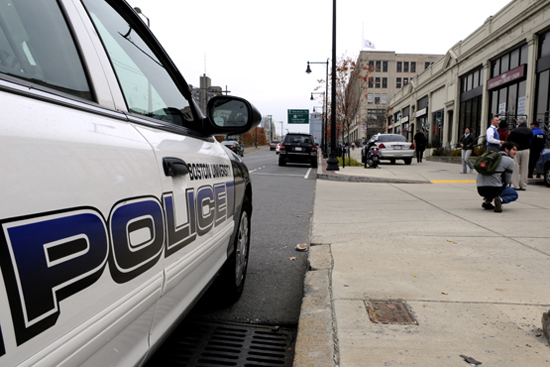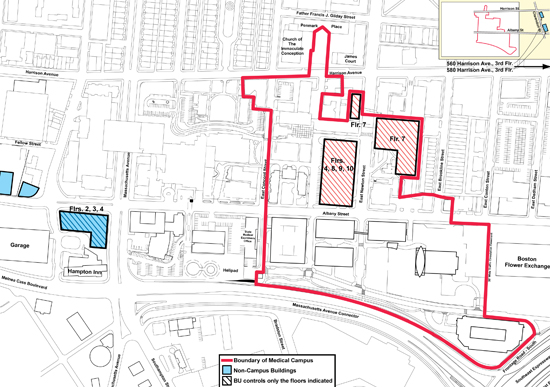Alcohol Arrests, Summonses Nearly Doubled in 2011
Annual BUPD crime report lists hate crimes for first time

Beefed-up enforcement by the University, Boston, and Brookline police departments led to more alcohol violation arrests last year. Photo by Kimberly Cornuelle
Arrests and summonses for liquor law violations on the Charles River Campus nearly doubled, to 102, last year from the previous year, according to the University’s annual crime report.
Meanwhile, hate crimes—which for the first time were required to be broken out from the other statistics—totaled four, all involving intimidation (three based on race, one on sexual orientation). “That’s disturbing,” says Scott Paré, deputy director of public safety and BU Police Department deputy chief.
Reported sexual assaults in 2011 crept up by one, to nine, according to the report, which is mandated by the federal Clery law. The report shows 13 armed robberies in 2011, up from 8 the previous year.
The spike in alcohol-related stats came as no surprise, given the beefed-up enforcement begun last year by the University, Boston, and Brookline police departments. “We have increased our alcohol patrols by quite a bit on Thursday, Friday, and Saturday nights,” Paré says.
While law enforcement actions rose last year, the number of students referred for University discipline for violations of BU’s alcohol rules (as opposed to the law) actually dropped from 620 in 2010 to 520 in 2011. There are several reasons for the difference. The arrests-and-summonses figures include those for people unaffiliated with the University and therefore not subject to discipline by BU.
Also, the federal reporting requirement doesn’t apply to off-campus crimes in buildings or locales that aren’t owned by BU or adjacent to University facilities. So students busted by police off-campus who face University discipline won’t show up in the BUPD report’s arrests-and-summonses figures, says Dean of Students Kenneth Elmore (SED’87).

University officials have stressed that drunkenness can make a person more vulnerable to assault, including sexual—“You can’t give consent very well while you’re under the influence,” Paré says—and sexual assault has “always been an underreported crime.” Last year’s documented attacks came during a period of heightened attention to the issue at BU, in large measure because of criminal cases against two hockey players (one of whom pleaded guilty, while charges against the other were dropped). A University task force reported last month on “a culture of sexual entitlement” among hockey players, a finding that led to management changes, sexual assault prevention education, and other reforms.
Sexual assaults aren’t the only instance in which the stats low-ball actual crime numbers. Because off-campus crimes aren’t included in the BUPD report’s numbers, next year’s report for 2012 will not include either the murder last April of Kanagala Seshadri Rao (GSM’13) or this semester’s spree of armed robberies of BU students and an alum near the Charles River Campus.
Moreover, even though larceny is “the number one crime on campus,” given the number of laptops, cell phones, handheld devices, and bicycles that are stolen annually, Paré says, reporting that crime is not required by the feds. (Larcenies that are hate crimes are required to be reported, however; BU had none last year.) According to BUPD Officer Peter Shin, larcenies rose to 398 last year, from 327 in 2010. Shin also keeps statistics on cases of breaking and entering, which fell from 81 in 2010 to 64 in 2011.

The mandated report also covers the Medical Campus, which last year saw one aggravated assault (versus two in 2010), two burglaries (three in 2010), and one robbery (none in 2010).
Next year’s report may contain better news regarding alcohol violations. So far during this current academic year, alcohol-related hospital transports for students are down 35 percent, and alcohol-related arrests and citations down 86 percent, from the same period last year, according to the BUPD. Paré speculates that the drop may reflect student awareness of the new, tougher enforcement after last year’s run-up in busts.
“Maybe the word is out,” he says: “‘You’ll get grabbed’” for liquor violations.
There’s also good news in another set of statistics from the BUPD, separate from the Clery report (covering off-campus crimes, for example, unlike Clery): the first 10 months of 2012 have seen a 29 percent drop in crime compared to the same period last year.

Comments & Discussion
Boston University moderates comments to facilitate an informed, substantive, civil conversation. Abusive, profane, self-promotional, misleading, incoherent or off-topic comments will be rejected. Moderators are staffed during regular business hours (EST) and can only accept comments written in English. Statistics or facts must include a citation or a link to the citation.